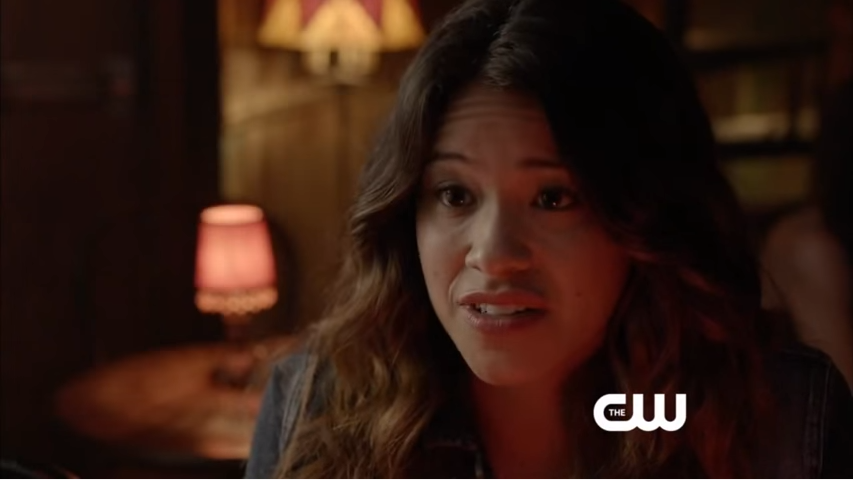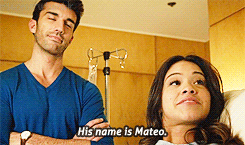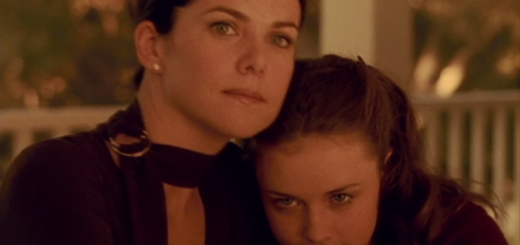The Politics of ‘Jane the Virgin’

By JORDAN ECARMA
This weekly column analyzing how women are portrayed in media is what happens when you’re a conservative feminist who loves movies (and TV). Feminism often uses the Bechdel test as a metric: Does this movie have a scene where two women with names talk about something other than a guy? The point of the test is not “movies that pass this are feminist”—it’s “this is the absolute base point of whether or not women are their own people in this movie.” I attempt to go a little further each week with a deeper analysis.
Note: Season 1 spoilers.
Artificial insemination. Virginity. Two love interests. What could go wrong?
Or rather … almost miraculously right. The CW’s “Jane the Virgin,” which is currently in its second season and returns in two weeks after Christmas hiatus, takes a precarious premise and delivers on all of its absurd and charming possibility.
As each episode does, let’s start with a recap:
Jane (played by Gina Rodriguez) had a plan. That plan involved staying a virgin until marriage, a decision influenced by her devout Catholic faith. But that plan was interrupted when she was artificially inseminated by a distracted gynecologist who mixed up an insemination and a pap smear. Romance, hilarity and a seriously unplanned pregnancy ensue.
Along with plenty of telenovela touches, “Jane the Virgin” is wonderfully rife with feminism; in fact, it’s a media moment where the Bechdel test seems superfluous and outdated (which is at it should be). The show centers on three generations of women: Jane, her mother and her grandmother—each powerful in her own way, each increasingly complex and interesting as the characters develop. Whatever else happens in Jane’s crazy life, this family is the foundation she always comes back to.
 Screenshot via YouTube
Screenshot via YouTube
Women in “Jane the Virgin” are complex, multi-faceted, fleshed-out people … which allows for plenty of discussion beyond the show’s feminist triumphs. For me, one of the show’s most unique qualities is its ability to bring in hot-button topics like immigration, abortion and income inequality without ever being heavy-handed.
Here are some ways today’s political scene is subtly woven throughout the “Jane the Virgin” storyline.
Putting a human face on the deportation debate
The immigration discussion has become incredibly ugly—whether it’s using the distant phrase “illegal aliens” or saying that kids born in the U.S. to immigrant parents are not Americans.
Abuela (played by Ivonne Coll), the matriarch of the unique family in “Jane the Virgin,” fled to America with Jane’s grandfather and did not come into the country legally. She lives in fear that her illegal status will be discovered and that she will be deported away from her family after living in the U.S. for decades.
The immigration debate has become so polarized that conservative Marco Rubio is viewed as an “establishment candidate” for wanting a process that would let “illegals” who have been longtime, peaceable U.S. residents become citizens. In a time of heated and sometimes extreme political rhetoric, I appreciate seeing a character on a TV show who humanizes the undocumented immigrant’s struggle.

Acknowledging “privilege” without caving to victimhood
Jane’s baby daddy, Rafael, happens to be a former playboy who owns the hotel where she works as a waitress. His life experience sharply contrasts with Jane’s—Rafael disappointed his father many times by partying instead of taking any job seriously, while Jane has always been a hard-working and ambitious individual who makes her mother and grandmother proud. Jane was born to a teenage mom, and her family has never been well off, while Rafael is accustomed to life in yachts and penthouses.
“Jane the Virgin” lightly touches on Rafael’s inherited privilege, contrasting it with Jane’s working-class struggle. Jane protests when he assumes that he can use money to make her life easy while she pursues writing during the pregnancy because working hard for her dreams is important to her. Strong, determined and independent, Jane works part-time as a waitress while earning her teaching degree. She applies that same self-starter work ethic when she decides to pursue writing.

Meeting a “choice” named Mateo
“Jane the Virgin” might fulfill the obligated nod to so-called reproductive rights by depicting the decision as Jane’s choice and featuring a scene when Jane’s mom, Xiomara (played by Andrea Navedo), asks if she would consider abortion as an option. It hardly matters—because there is no more convincing pro-life argument than simply showing the person that would not exist in this world if his or her mother had chosen an abortion. As I wrote while contrasting “Scandal” and “The Mindy Project” earlier this year, no pro-life argument is more convincing than seeing the life that would have been snuffed out if the mother had decided to have an abortion.
In a flashback moment, Xiomara reveals that her own mother told her to get an abortion when 16-year-old Xiomara found out she was pregnant. But Alba, Jane’s abuela, is thankful every day that Xiomara said no and decided to have her baby even though she was in a difficult situation as a pregnant teen. If she had decided to exercise her “right” to have the abortion, Jane would not exist.
Of course, if Jane had gotten an abortion, there would be no plot for the show. But beyond that, Jane would not have welcomed little Mateo into her life. Her precious joy and overwhelming love are evident after Mateo’s birth in the season 1 finale—and infinitely more effective than the most carefully worded pro-life case.

Jordan Ecarma is a former journalist now living the millennial dream: getting paid for writing Facebook statuses (that is, digital PR). She watches her use of the f-word (“feminism”) around conservatives and the c-word (“conservatism”) around feminists. Find her under @JordanEcarma.



